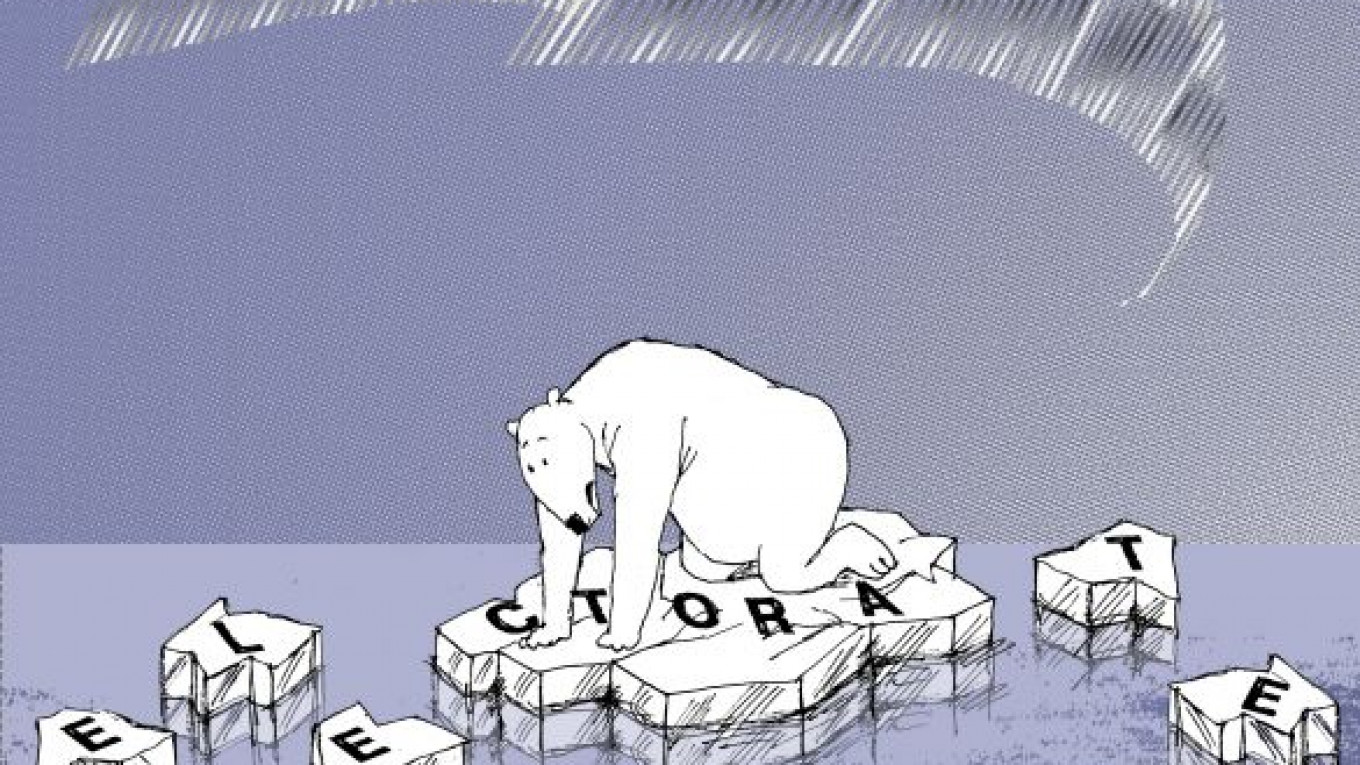The Novgorod region has beautiful churches, but otherwise it’s nothing to write home about. It’s a very typical Russian region, and that’s why Novgorod is so important politically. Analysts discovered that the election results in Novgorod come very close to the results of the national vote. Novgorod is in this sense the Russian New Hampshire. If you know the voters’ preferences in Novgorod, you can predict the results of the national elections.
So the results of an opinion poll held in Novgorod in October by VTsIOM and published by Gazeta.ru are something of a sneak preview of the State Duma elections to be held on Dec. 4. The poll showed the following distribution of votes: 40 percent of the respondents are planning to vote for United Russia, 13 percent for the Communist Party, 9.4 percent for Vladimir Zhirinovsky’s Liberal Democratic Party and 7.8 percent for A Just Russia — enough to overcome the 7 percent electoral barrier and enter the Duma. The other parties’ vote counts were within the range of statistical error.
Very similar results were registered in Novgorod before the last elections. But there’s a puzzle here. How does United Russia intend to repeat the results of the last elections, when they got 63 percent of the votes?
Even if the 16 percent of undecided voters get off the couch on election day and 40 percent of them follow their peers and vote for United Russia, the party still will not have a parliamentary majority. With two weeks to go before the elections, the party needs a miracle to get the votes they need.
But there’s no need to worry about United Russia. They might not have a magic wand, but they do know the magic words “administrative resources.” Information about bureaucrats using state resources to sway voters is streaming in from dozens of places around the country.
In small towns like Syzran in the Samara region, where no Great Wall of China separates the bureaucrats from the population, the campaigning is patriarchal and old-fashioned. At farmers’ markets organized with taxpayers’ money, local mayors urge their constituents to vote for United Russia.
In larger cities, officials use more persuasive arguments. At a meeting with pensioners, the city manager of Izhevsk told voters directly that the municipality would finance districts in proportion to the number of votes cast for United Russia.
An interactive map on Kartanarusheniy.ru already shows more than 2,000 similar violations, and an average of 60 violations is reported every day. All parties are cited for electoral violations, but more than half are laid at the door of United Russia. From the list of violations, you get the impression that everyone who gets a state paycheck is a volunteer for the ruling party. Mail carriers deliver United Russia flyers during work hours. After work, the flyers are delivered by teachers. Public schools are often the sites of United Russia campaigning.
A schoolchild in Krasnoyarsk had his 15 minutes of Internet fame when he scrawled “the party of crooks and thieves” on a United Russia poster in his school. Of course, it is against the law to deface property, but it is also against the law to put up campaign materials in a public school.
The fight against other parties is even more active than the campaigning itself. In many cities, A Just Russia’s billboards are taken down at night. In other places, it does not come to that for the simple reason that the owners of the outdoor advertising space refuse to put up their billboards in the first place. In Vladivostok, the police confiscated a print run of brochures for an opposition candidate right off the press.
Some private businesses are active in the campaign as well. There were reports on Kartanarusheniy.ru that employees of companies owned by the deputy of the Samara regional Duma, Vladimir Simonov, were forced to cast their vote for United Russia — and to send a photo of the ballot by cell phone as proof. ?
Foreign and domestic admirers of Prime Minister Vladimir Putin always cite his high ratings and the majority of votes United Russia gets at the elections. While that is a fact, it is also a fact that in fair elections the ruling party would not have a chance of a getting a parliamentary majority. Besides, all bubbles, including ratings bubbles, eventually collapse. In March 1991, a large percentage of Soviet citizens voted to preserve a renewed Soviet Union. But the country collapsed in less than a year.
In those months before the breakup of the Soviet Union, the most popular political song was Viktor Tsoi’s “(We’re Waiting for) Change.” Once again, this song is back in the charts. The men in the Kremlin should be paying attention to those ratings, too.
Victor Davidoff is a Moscow-based writer and journalist whose blog is .
A Message from The Moscow Times:
Dear readers,
We are facing unprecedented challenges. Russia's Prosecutor General's Office has designated The Moscow Times as an "undesirable" organization, criminalizing our work and putting our staff at risk of prosecution. This follows our earlier unjust labeling as a "foreign agent."
These actions are direct attempts to silence independent journalism in Russia. The authorities claim our work "discredits the decisions of the Russian leadership." We see things differently: we strive to provide accurate, unbiased reporting on Russia.
We, the journalists of The Moscow Times, refuse to be silenced. But to continue our work, we need your help.
Your support, no matter how small, makes a world of difference. If you can, please support us monthly starting from just $2. It's quick to set up, and every contribution makes a significant impact.
By supporting The Moscow Times, you're defending open, independent journalism in the face of repression. Thank you for standing with us.
Remind me later.


